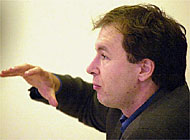Swiss politicians take part in alternative Davos meeting in Brazil

A delegation of Swiss parliamentarians and party officials are taking part in a meeting in Brazil, set up as an alternative to the World Economic Forum summit in Davos.
The gathering has been organised to examine alternative answers to the issues being discussed in Davos. Entitled the World Social Forum, the four main themes of the conference are “the production of wealth, access to wealth, boosting the influence of civil society, and political and ethical power for a new society”.
The meeting, in the Brazilian city of Porto Alegre, has been organised by a number of non-governmental organisations (NGOs), as well as the Brazilian Workers party and two Brazilian universities.
The Swiss delegation is made up of eight politicians from French-speaking Switzerland, including six members of parliament and two officials from the green and socialist parties. The Swiss NGO, E-Changer, is sponsoring their trip.
For the Swiss team, the World Social Forum offers an opportunity to protest against economic policies they oppose, and to put an emphasis on social solutions to economic problems.
Pierre Yves-Maillard, a member of parliament from the Swiss socialist party, told swissinfo that he is going to Brazil to challenge, what he calls “the neo-liberal and ultra-liberal policies” being promoted at Davos.
“I think it’s time now not only to protest,” he said, “but also to build a network between the people who think the world is not following the right path and to build concrete solutions for poor populations.”
The group, who left Switzerland on Saturday, was also scheduled to meet with Swiss volunteers working near Sao Paolo.
Thérèse Meyer, a member of parliament from the Christian Democratic party, told swissinfo she has nothing against the meeting in Davos. Rather, she hopes to gain a new perspective on the issues confronting the world’s developing nations.
“I am not going to protest against Davos,” she said. “But because I feel that as members of parliament, we should also look at other social realities, in order to take better decisions as lawmakers.”
The conference organisers say they expect some 10,000 people to participate, including representatives from 900 NGO’s. They also hope that international personalities like the French anti-capitalist campaigner, José Bové, and the former South African president, Nelson Mandela, will be in attendance.
The organisers plan to present the propositions, being discussed at the conference, to the International Monetary Fund and the World Bank in April.
by Anna Nelson

In compliance with the JTI standards
More: SWI swissinfo.ch certified by the Journalism Trust Initiative
You can find an overview of ongoing debates with our journalists here. Please join us!
If you want to start a conversation about a topic raised in this article or want to report factual errors, email us at english@swissinfo.ch.